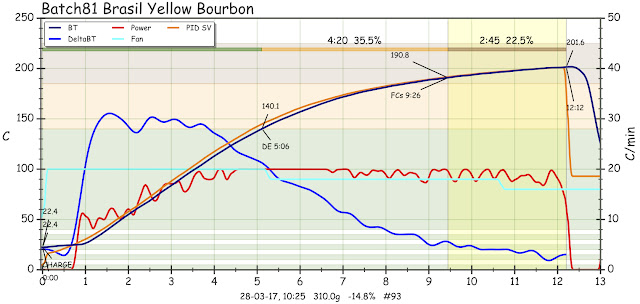by Tije de Jong
Trial and error
A few days ago I made a first successful attempt to improve the PID settings on the roaster.
I’m certainly not an expert in this: I have only a faint idea of how a PID works, and what the
effect is of each of the P, I, D-vaues.
Therefore, a bit of trial and error seemed the best way to go for me.
The settings I had been using since we fist got the roaster to work (P=1.0 =I=0.5 D=0.0), didn’t
lead to the desired controllable roasting process.
In particular during the drying phase, where the inclination of the profile is rather steep, I had to
slide the background back and forth in order to get the machine on the right track.
Once passed dry end, the system gained some stability.
D for derivative
I was told that the P-value could be regarded as the gas throttle of the machine.
The function of the I and D were still a mystery to me.
At first I tried increasing the I, which gave a slight better control, but still not satisfactory.
It seemed that the machine was responding too late and too much to any deviation from the desired curve.
After that I raised the D-value a little which worked a little better.
When raising the D substantially I noticed a large improvement in the functionality of the machine.
It appeared to me that this D-factor gave the system a better ability to look ahead and anticipate
what’s coming.
The settings at this moment: P=20 I=5 D=20.
Now, the machine reacts way more subtle and accurate.
I will use these settings for a while and in the future I will probably try a few more adjustments.

